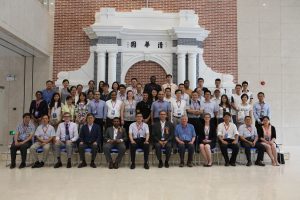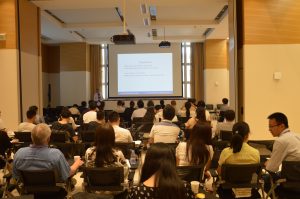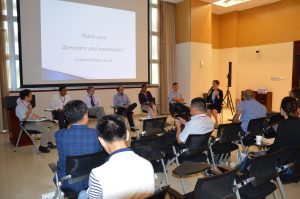On 3-5 July 2017, the UK-China Joint Workshop on Urban Flooding and Sponge Cities was held in Shenzhen. The workshop was aimed at early career researchers from two countries to enable networking and sharing of research findings in sustainable urban water management. The workshop was funded by the British Council, the National Natural Science Foundation of China (NSFC) and EPSRC (via the BRIM project), and was organised by Professor Dragan Savić FREng, Professor Guangtao Fu, and Dr Albert Chen (University of Exeter), on the UK side, and the Chinese partners led by Professor Yuntao Guan and Professor Haifeng Jia (Tsinghua University) and Professor Huapeng Qin (Peking University).
The workshop provided a platform for researchers, urban planners and engineers to discuss critical issues and main challenges, share the latest research outcomes, and demonstrate the best practices in flood risk management and Sponge City developments. Over 40 participants from the UK, China, Canada, Japan, South Korea and Sri Lanka attended the workshop and presented a wide range of methodologies and applications, including flood simulation and risk assessment tools, new and emerging metrics, and frameworks that can be used for design, planning and assessment of sponge cities. Few distinguished experts in the field, including Paul Leinster (Cranfield University), Nigel Wright (De Montfort University), Sarah Bell (University College London), Janaka Ruwanpura (University of Calgary) and Mooyoung Han (Seoul National University), also delivered keynote talks during the workshop.
Programme
Day 1 (3rd July, 2017)
Keynote talks
09:50-10:20 Flood risk management and incident response in practice (Paul Leinster)
10:20-10:50 Planning and mitigation of natural disasters through network modelling (Janaka Ruwanpura)
10:50-11:20 Analysis of Korea rain and flood management development history and case (Mooyoung Han)
11:20-11:50 Sustainable urban water system and several case studies in China (Haifeng Jia)
Section I
14:00-14:30 Flood Risk and Resilience: a Case Study of London (Guangtao Fu)
14:30-14:45 Onsite Algae harvesting using micro and nano(sub-micron) bubbles (Seunguk Lee)
14:45-15:00 Comparative study of planning, design and engineering management of urban drainage and flood control in shenzhen and hongkong (Juntao Jin)
15:45-16:15 How do we put urban flood resilience into practice? (Nigel Wright)
16:15-16:30 “Sponge City” – a breakthrough of urban flood risk management and land use planning: the case of Ningbo pilot study (Faith Ka Shun Chan)
16:30-16:45 Sponge cities: a perfect solution for China’s urban flooding problem (Komali Kantamaneni)
16:45-17:00 Assessment of long-term performance of the green infrastructures in the urban catchment (Ahilan Sangaralingam)
17:00-17:15 A stochastic stormwater quality volume sizing method with first flush emphasis (Soroosh Sharifi)
Day 2 (4th July, 2017)
Section II
09:00-09:30 Assessing the functionality of urban sponges for runoff reduction and purification (Huapeng Qin)
09:30-09:45 Can the use of CCTV images in cities offer valuable observations for urban flood forecasting? (Sanita vetra)
09:45-10:00 Technology of collection and reuse for roof runoff (Yang Yu)
10:00-10:15 Technology of dual-media filtration for treatment of stormwater runoff of building subdistrict under rapid filtration conditions (Yi Tao)
10:15-10:30 Analysis of practical rural sewage collection and processing pattern in areas of the North China (Fengqing Guo)
11:00-11:30 Systems engineering approach to urban groundwater resilience (Ana Mijic)
11:30-11:45 HiPIMS: A high-performance integrated hydrodynamic modelling system for large-scale high-resolution flood simulations (Xilin Xia)
11:45-12:00 Flood inundation modelling of flash floods in steep river basins and catchments (Reza Ahmadian)
Section III
14:00-14:30 Frameworks for urban water sustainability: telling the stories of urban drainage (Sarah Bell)
14:30-14:45 Physical scale modelling of urban flood systems (Matteo Rubinato)
14:45-15:00 Enhancing future resilience in urban drainage system: green versus grey infrastructure (Xin Dong)
15:00-15:15 Future urban water-cycles (Tse-Hui Teh)
15:15-15:30 EEM spectrum of DOM for urban water environment: application and development (Erdeng Du)
16:00-16:30 Sustainable solution for retrofitting of flood damaged bridge (Ranjith Dissanayake)
16:30-16:45 Potential for natural retention of flood water in Nigeria (Olalekan Adekola)
16:45-17:00 A tailor-made urban drainage system rehabilitation method for large cities with limited underground spaces (Kegong Diao)
17:00-17:15 Sponge city construction in the reclamation area: a case study (Haixing Liu)
17:15-17:30 Comparison of permeability test methods to characterize on-site rainwater infiltration (Jooho Chung)
Day 3 (5h July, 2017)
Section IV
09:00-09:30 Has high-resolution, two-dimensional flood modelling come of age? (Dragan Savic)
09:30-09:45 Uncertainty estimation of urban areal rainfall by point rain gauge measurements (Siao Sun)
09:45-10:00 Precipitation newscast in the context of urban flood risk management (Yunqing Xuan)
10:00-10:15 Modelling approach development for predicting particle size distribution on urban roads (An Liu)
10:15-10:30 High-resolution urban rainfall-runoff modelling and its application in the Sponge City Program in Xi’xian New Area (Jingming Hou)
11:00-11:30 Flash flood modelling in urban area (Albert Chen)
11:30-11:45 Involving the private sector in urban flood response agenda: exploring the role for area business continuity planning (Gayan Wedawatta)
11:45-12:00 Influence of low impact development construction pollution on road dusts and stormwater runoff (Yukun Ma)
12:00-12:15 High performance concrete comprising nano & micro silica for faster construction practices (Thushara Priyadarshana)


